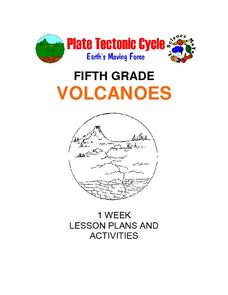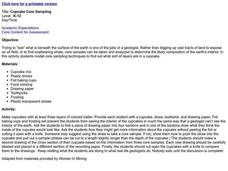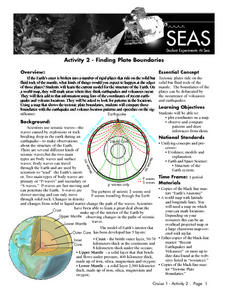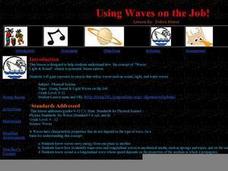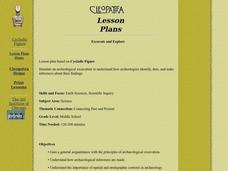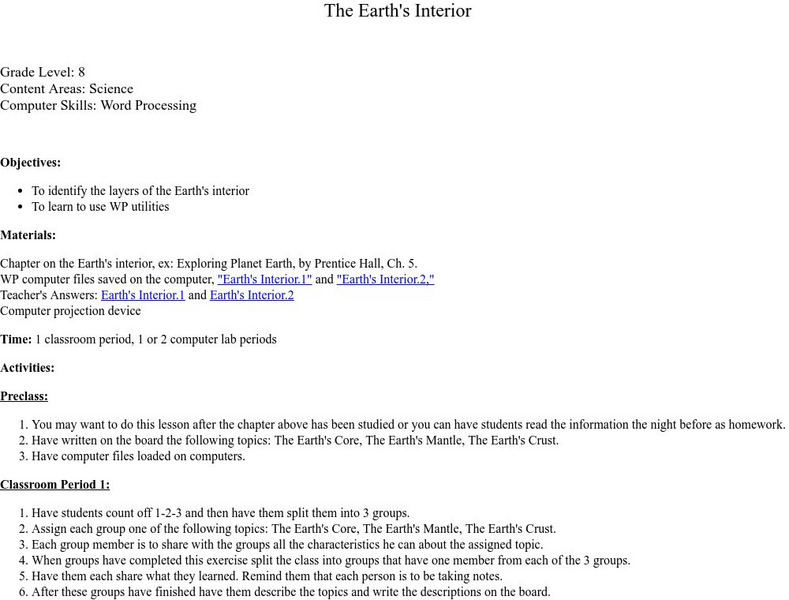Curated OER
Interior of the Earth
Sixth graders identify and describe the composition and physical properties of the layers of the Earth. They also explain how scientists used the scientific process to know about the center of the Earth. Finally, 6th graders read a...
Curated OER
Seafloor Spreading
In this seafloor spreading worksheet, students use 12 given terms to complete sentences about the layers of the Earth and the components of the layers of the Earth.
Curated OER
Plate Tectonics: An "Eggs"periment
Students investigate plate tectonics by observing a cracked egg shell. For this Earth science lesson, students draw borders of continents on an egg shell, only to watch it crack in a glass. Students record the breakup of the...
Curated OER
Cupcake Core Sampling
Students discuss core samples. In this environment instructional activity, students experiment discovering what is beneath the surface by using cupcakes as models finding out what sort of layers are found within the cupcakes.
Curated OER
Solid Earth Socratic Questions
Students participate in a whole class discussion to relate what they know about earthquakes to the processes of plate tectonics. They respond to prompts that lead them to conclusions about the layers of the earth.
Curated OER
Greenhouse Effect: Pop Bottle Experiment
Students explore global warming by conducting a weather experiment. In this greenhouse gas lesson, students define the greenhouse effect and the impact on our ozone layer. Students utilize a soda pop bottle, floodlight bulb, thermometers...
Curated OER
Earthquake Information
In this earthquake worksheet, students complete a crossword puzzle by determining the terms associated with the 8 given clues.
Curated OER
Volcanoes: Fifth Grade Lesson Plans and Activities
Fifth graders explore volcanoes and the rocks they produce using the Internet. The lab portion of the lesson prompts young scientists to compare and describe igneous rocks. Next, they critique a pair or more of...
Curated OER
CUPCAKE CORE SAMPLING
Students explore what is beneath the surface of the earth is one of the jobs of a geologist. Rather than digging up vast tracts of land to expose an oil field, or to find coalbearing strata, core samples can be taken.
Curated OER
Recent Volcanoes And Earthquakes:
Students investigate the current model for the structure of the Earth. On a world map, they mark areas where they think earthquakes and volcanoes occur and compare those areas with earthquake and volcano location patterns.
Curated OER
Using Waves on the Job!
A colorful and comprehensive PowerPoint highlights this lesson on waves. Junior geophysicists pretend that they are hired to analyze seismic waves. A worksheet is provided to go along with an online article about how compact discs work...
Curated OER
Rock My World
Middle schoolers conduct a hands-on experiment designed to demonstrate how continents and oceans formed and why the manner of formation is relevant to a study of volcanoes.
Curated OER
Excavate and Explore
Students simulate an archeological excavation to explain how archeologists identify, date, and make inferences about their findings. They explain the importance of spatial and stratigraphic contexts in archaeology.
Curated OER
How To Build a Planet From The Inside Out!
High schoolers read about the Spitzer Space Telescope and the technology used to learn about planet composition. They calculate the radius of a planet, the size of a planet, the average density of a planet and the likely core composition...
Curated OER
Plate Tectonics Review
In this plate tectonics worksheet, students review concepts such as the types of plate boundaries, the concept of continental drift, sea-floor spreading, earthquakes, and plate tectonics. They match 30 terms with their definitions.
Curated OER
Changes Inside Planets
Students relate meteorites to the mantle and crust of asteroids. In this planetary lesson students complete experiments to model the separation of light.
Curated OER
Hinode-Close Up of a Sunspot
In this solar sunspot worksheet, students use two photographs from the Hinode solar observatory showing a sunspot on the solar surface. Students solve 5 problems including finding the scale of the images, determining the smallest detail...
Curated OER
Human Impact on the Environment
In this environmental science worksheet, students complete a crossword puzzle with 26 questions about human impact on the environment.
Curated OER
Reservoirs and Production
Students complete activities for a lesson about reservoirs and production. In this geology lesson, students complete a 7 page packet of activities to explore porosity, permeability, and rock properties.
Curated OER
How Volcanoes Grow
Pupils study volcanoes including rock fragments, ash, aerosols and gases. In this volcano lesson students divide into groups and build models of the three major types of volcanoes.
Curated OER
Changes Inside Planets
High schoolers investigate the concept of planetary differentiation. They complete an experiment to simulate it using gelatin and food. The lesson includes vocabulary to increase reading comprehension skills as part of the inquiry. The...
Annenberg Foundation
Annenberg Learner: Essential Science for Teachers: Earth and Space 3
Visit an active volcano site to find out the connection between the movement of the Earth's plates and the processes deep within the Earth's interior. [58:23]
Columbia University
Columbia University: Evidence for Internal Earth Structure and Composition
This resource describes how seismic waves have helped us to understand the composition of the Earth's interior. It discusses seismic discontinuities, including the Mohorovicic Discontinuity or Moho, and what we have learned about the...
NC State University
North Carolina State University: The Earth's Interior
Improve understanding of word processing and knowledge of the layers of Earth's interior. Links to North Carolina State Standards.







